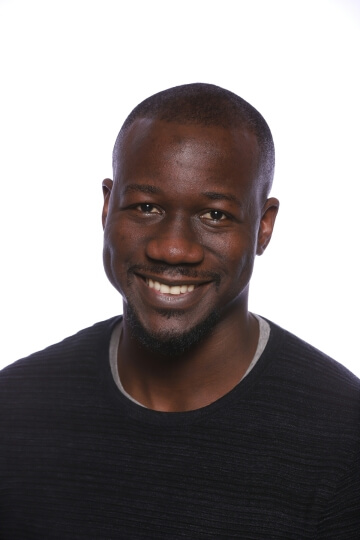Jonathan Kola, A.B. '12
When Jonathan Kola met two students from MIT’s Sloan School of Management in his last year at Harvard, his life changed. The students were trying to found a company to improve recycling in Lagos, Nigeria, but they needed someone who could handle the computer programming and other technical elements. Kola, an electrical engineering and computer science concentrator at the Harvard John A. Paulson School of Engineering and Applied Sciences (SEAS) who grew up in Nairobi, Kenya, was intrigued.
“Working in Africa after graduation was always something I wanted to do, but I didn’t necessarily plan for it to happen as quickly as I did,” said Kola, A.B. '12. “It was really exciting to take an idea from nothing, turn it into something, and see its impact. It was very empowering that a few young people were able to make this kind of impact.”
That start-up, Wecyclers, ended up influencing so many decisions Kola would make later in his career. Like the MIT students, he went on to business school, getting his MBA from Stanford University Graduate School of Business. He eventually founded his own company, AMT Technologies, in Kenya to address another need: safer driving and fewer road casualties.
“I intended to only stay for a couple weeks at Wecyclers, but I ended up staying for two years,” he said. “It just ended up being a fantastic couple of years. It made everything a lot more accessible, and made the decision to do AMT more familiar.”
AMT produces an artificial intelligence-based driver safety platform, capable of detecting everything from potential collisions to distracted driving. Kola founded the company to address a major challenge in Africa, which has the highest rate of road deaths of any region in the world, with Kenya among the worst countries. Kola attributes those casualties to a range of factors, from poorly maintained roads to lax enforcement of road rules to a high frequency of older cars.
“A vehicle that rolls off the Ford manufacturing line in 2024, it’ll have so many bells and whistles with regards to safety, such as self-braking systems and collision warning,” he said. “But in Kenya, for example, most of the vehicles that are imported tend to be at least seven years old, so they’ll have less sophisticated safety systems.”
Kola came to Harvard already planning to study engineering, but doing electrical engineering required computer science courses as well. Taking the computer science introductory course, CS50, early on reinforced that he wanted to study both.
“Harvard was extremely exciting, and an adventure I was more than glad to jump into,” Kola said. “It was a completely transformational experience. At the school of engineering, we were a relatively small program compared to some of the other concentrations. It was so collaborative. We really grinded, but we had a really good culture.”
After graduating both SEAS and Stanford, Kola devised AMT Technologies during his three years as a cloud engineer at Google. He was fascinated by the company’s ongoing research into self-driving cars, but noticed that the streets those cars were tested on were of a much higher quality than in his home country.
“Part of the motivation for self-driving cars is the belief that they could lead to a massive reduction in loss of life on the road,” he said. “All of the training and technology development was happening in a completely different physical environment. I’m always curious about new technologies, always trying to see what’s out there and how it could be applied to Kenya.”
Founded in April 2020, AMT’s device is produced in-house. Kola said this allowed them to iterate quickly, but it’s difficult to scale up production. As the company continues to find ways to scale up production, it targets both individual drivers and fleets.
Kola said keeping a start-up funded in its early stages can be one of the biggest challenges for young entrepreneurs, especially when producing hardware, which can be more expensive to redesign and test. His advice to young entrepreneurs: look for accelerators and other funding sources to help you stay afloat early on.
“The more cushion you can have, the better,” he said. “Starting companies is hard, but it’s very worthwhile. Everything is so unknown that the best way to learn is really through just doing it and getting experience.”
